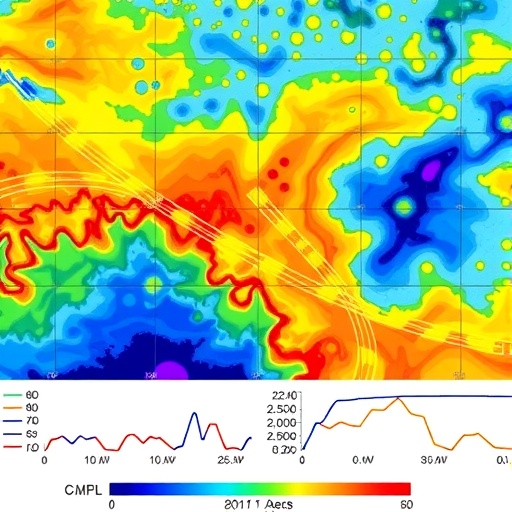In the ever-evolving field of data science and artificial intelligence, the necessity for precision in the analysis has never been as paramount as today. Researchers like Dashti, Trumpp, and Ystroem have delved into the complexities of training deep neural networks specifically in the context of imbalanced geochemical data distributions. Their groundbreaking study, published in Nature Resource Research, sheds light on the challenges and innovative methodologies associated with mitigating uncertainty in deep learning models. The implications of their work are profound, especially as they highlight critical avenues for enhancing predictive accuracy and reliability in geochemical studies.
The essence of the research focuses on the inherent difficulties posed by imbalanced datasets, a scenario routinely encountered in geoscience applications. Geochemical data often comes from diverse sources and exhibits significant variance in the representation of different classes of data. Dashti and colleagues argue that traditional approaches can lead to biased models that fail to perform adequately when faced with underrepresented classes. They propose a framework that integrates uncertainty-aware training techniques, aimed at improving the robustness of deep learning models when applied to such skewed distributions.
One of the standout features of their approach is the emphasis on uncertainty quantification—a domain often overlooked in deep learning. By incorporating uncertainty into model training, the researchers can enhance the decision-making process, especially when the stakes are high, such as in natural resource management or environmental monitoring. This dual focus on performance and uncertainty provides a more nuanced understanding of model predictions, which is crucial in scientific domains where data variability can be dramatic.
To achieve these objectives, the research team developed an advanced methodology that combines deep learning architectures with probabilistic modeling techniques. They benchmarked their approach against established methodologies to ensure a robust analysis of its effectiveness. The results indicated not only improved predictive accuracy but also a significant reduction in uncertainty associated with predictions made by their models. This is a pivotal step forward, as it lays the groundwork for a more reliable application of artificial intelligence in fields requiring meticulous data interpretation.
A critical takeaway from Dashti et al.’s work is the intricate relationship between uncertainty and predictive performance. Their findings suggest that by explicitly modeling uncertainty, machine learning practitioners can better identify instances where predictions are likely to fail or require further investigation. This insight is particularly relevant for geochemical researchers who must make decisions based on incomplete or varied data. By informing users about the confidence of predictions, the established framework aids in navigating the complexities of real-world applications.
The study also engages with practical implications, showcasing how the proposed methods can be integrated into existing workflows within geochemical research. The authors meticulously detail the steps necessary for implementing uncertainty-aware deep learning models, highlighting the accessibility of their methods for practitioners who may not be deeply versed in advanced machine learning techniques. This bridging of knowledge between computational techniques and domain-specific applications is a critical aspect of ensuring that scientific advancements are translated into actionable insights.
Moreover, Dashti, Trumpp, and Ystroem address the ethical considerations that arise from machine learning in ecological contexts. As data-driven decision-making becomes more commonplace, ensuring fairness, accountability, and transparency in model outputs is crucial. Their framework encourages the proactive examination of biases within geochemical datasets, emphasizing the moral responsibility researchers have when developing models that influence environmental outcomes.
In a world increasingly driven by data, the ability to manage and interpret uncertainty stands as a significant challenge in various research disciplines. By focusing on uncertainty-aware neural networks, the authors of this study not only contribute to the technical literature but also spur a broader dialogue on the implications of machine learning in scientific inquiry. Their work exemplifies the intersection of technology and application, providing a pathway forward for researchers in fields where uncertainty is a fundamental element of the research landscape.
As the environmental challenges faced by our planet continue to escalate, the need for precise and reliable scientific tools only intensifies. The findings of this research emphasize the potential of machine learning to transform the way we analyze complex data while simultaneously addressing the limitations posed by imbalance and uncertainty in data distributions. As detailed by Dashti et al., the interplay between enhanced model performance and the quantification of uncertainty presents an opportunity for more informed decisions in environmental science and beyond.
In conclusion, the pioneering research conducted by Dashti, Trumpp, and Ystroem introduces critical advancements in the training methodologies of deep neural networks, especially when applied to the nuanced field of geochemistry. Their focus on uncertainty-aware models not only advances machine learning practices but also ensures that scientific methodologies remain robust and reliable amidst the complexities of real-world data. As we move forward, the integration of such innovative approaches will undoubtedly pave the way for more sophisticated scientific exploration and understanding.
The implications of this study are vast, and as researchers continue to refine their methods for data interpretation, the groundwork laid by Dashti and colleagues will be a reference point for future inquiries into uncertainty, model reliability, and data representation in various scientific fields.
Subject of Research: Imbalanced Geochemical Data Distributions
Article Title: Uncertainty-Aware Deep Neural Network Training for Imbalanced Geochemical Data Distributions
Article References:
Dashti, A., Trumpp, M., Ystroem, L.H. et al. Uncertainty-Aware Deep Neural Network Training for Imbalanced Geochemical Data Distributions. Nat Resour Res (2025). https://doi.org/10.1007/s11053-025-10568-w
Image Credits: AI Generated
DOI: https://doi.org/10.1007/s11053-025-10568-w
Keywords: Uncertainty Awareness, Deep Neural Networks, Geochemistry, Imbalanced Data, Predictive Modeling, Environmental Science, Data Science, Machine Learning, Probabilistic Models.




